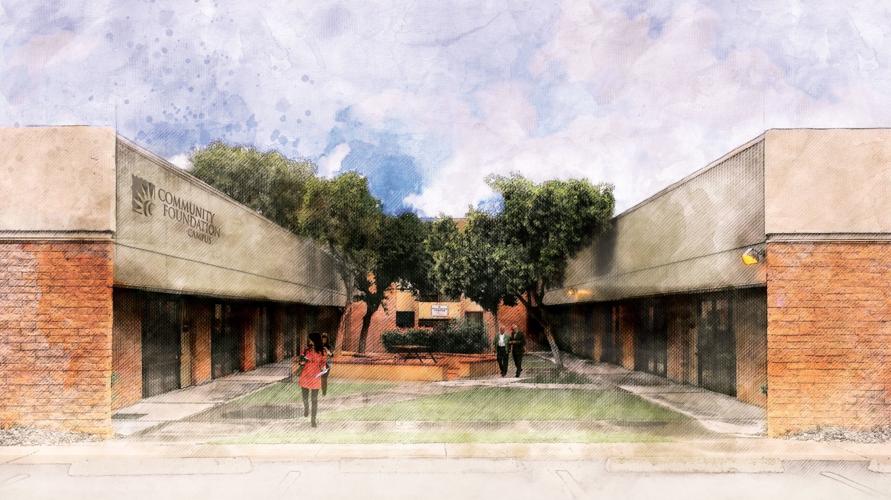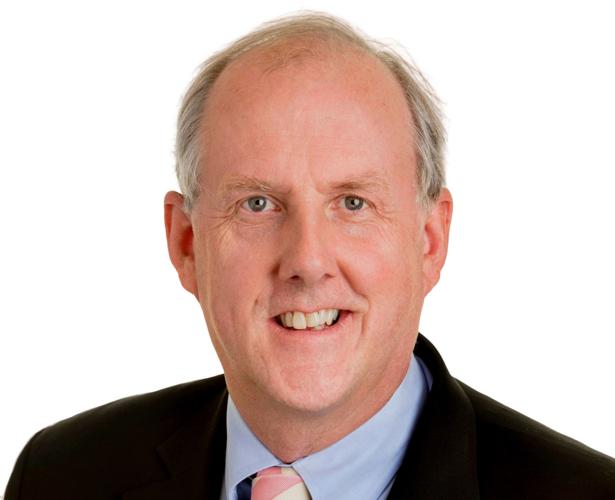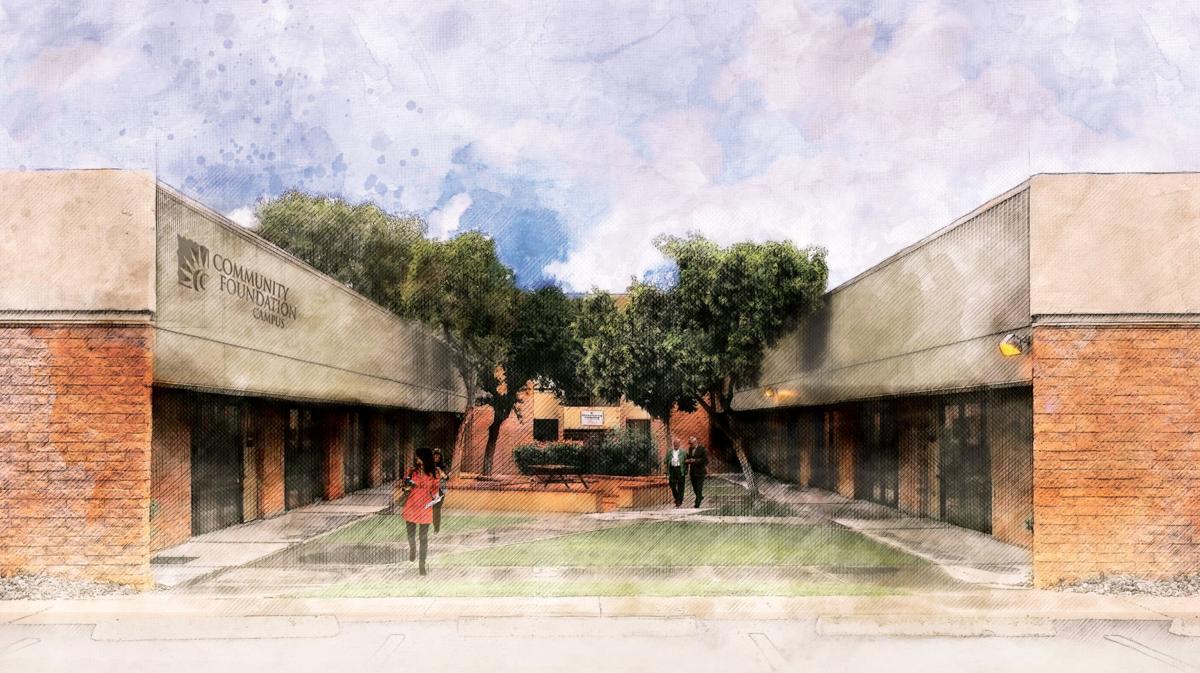Clint Mabie is a matchmaker — connecting philanthropic donors with causes dear to their hearts.
During his 10 years as president and chief executive officer of the Community Foundation for Southern Arizona, Mabie has earned the trust of donors who have given to the foundation to help strengthen nonprofit organizations.
Under Mabie’s leadership, the foundation’s assets have grown from $90 million to nearly $165 million. And donors direct about $10 million a year through the foundation for causes they champion.
“Our work is challenging in that we are working with donors in fiduciary relationships,” said Mabie. He said the foundation works with 42 nonprofits and it manages and builds their endowments. The foundation is on excellent footing, which makes it the right time to retire, Mabie said in a recent interview. He said his retirement becomes official on Dec. 31, and he will stay through the end of the year to support the successful transition to a new leader.
“I would like to thank our board of trustees and the staff at CFSA for their tireless support, and our community and nonprofit partners for their dedication,” Mabie said. He said he is especially grateful to the foundation’s “donors who have enriched my life and that of the community over the last decade.”
“The impact we have made as a foundation to improve the quality of life in Southern Arizona would not have been possible without their support. I have every confidence in our current team, and I believe that CFSA has its best days ahead,” Mabie said.
Claudia Jasso, chair of the foundation’s board of trustees, praised Mabie’s dedication to donors, his ability to bring people together from multiple sectors, and positioning the foundation to take on a greater role in creating equitable and vibrant communities.
A search committee will be formed to help identify the foundation’s next leader, said Jasso.
Mabie, along with his staff, work as investment advisors for philanthropists. The 58-year-old native of Chicago has worked to increase the scope, impact and diversity of the foundation’s philanthropic efforts.
Some give charitable donations to food programs for needy families or to job programs for youths or to scholarships for college-bound students. Others direct their funds to rural communities to help families with health care or to clothing banks or to pet clinics. Donations also go to arts and culture, environment, health and human services, and diversity programs.
The foundation has responded to challenging times such as the Jan. 8, 2011 mass shooting that killed six and wounded 13, including then-U.S. Rep. Gabrielle Giffords.
The shooting took place at a shopping center on Tucson’s northwest side when Giffords was meeting with constituents. Mabie helped establish several funds and distributed more than $1 million to victims, families and nonprofits supporting the community in the aftermath.
Most recently, he began two COVID-19 Response Funds that have distributed over $1.5 million in aid to Southern Arizona’s nonprofits during the pandemic. The foundation is also working to raise another $2 million from donors in partnership with the city of Tucson for coronavirus aid to nonprofits, said Mabie.
The needs are many and the foundation has expanded its partnerships into the government, business and educational sectors to work with nonprofit organizations.
Some of those partnerships include working with the University of Arizona’s Eller College of Management and the Southern Arizona Leadership Council to have a database that gives continually updated comprehensive economic and lifestyle information. The data, which offers comparisons to other communities, can be used by the public and business and government leaders for planning and quality-of-life decisions.
Construction crews started laying the foundation for a 30-foot tall border wall across the San Pedro River in Cochise County. As of July 8, they already built about a half-mile of wall to the east of the river.
Mabie also is proud of bringing diversity into foundation projects and on the board, and championing other programs and boards to do the same. He worked on the African American Initiative under late educator, philanthropist and civic leader Anna Jolivet. The initiative gave $200,000 to nonprofits that work within African American communities.
The initiative is now the African American Legacy Fund headed by Kendal Washington White, University of Arizona vice provost for campus life and dean of students.
This is White’s second time working with the foundation. She described her first time before Mabie as “an environment without diversity” where she did not feel welcomed.
She left the foundation and returned to work on the initiative years later and found herself “surrounded by black/African American community leaders, who I greatly admired and their sheer will to activate the vision of what Southern Arizona can be when we bring together people, money and goodwill to make sure all of our children, youth and families have the opportunities and resources to prosper.”
“Clint was instrumental in the deployment of Dr. Jolivet’s vision and his relentless optimism with moving the board members forward by listening, nudging, and connecting us to other organizations and people,” said White. She said Mabie has assembled “an incredibly talented group of professionals who are responsive, think big picture and (are) eager to advance” the foundation’s footprint in Tucson.
Jasso leads the Latino Community Fund, which in its inaugural year raised more than $20,000 from philanthropists for social justice and racial equity causes.
This fund for these causes was long overdue, said Jasso, adding that Latinos make up more than 40% of the population in Pima County.
She said she has prioritized integrating the foundation’s board to reflect Southern Arizona’s community, and much work still needs to be done.
Another highlight at the foundation Mabie led to fruition is the purchase and renovations of its campus in 2018, which serves as a centralized resource center for the public and nonprofits to attend workshops to learn how to grow their organizations. Seminars include training in human resources, fundraising, marketing, the development of annual giving plans, and information technology that covers the use of social media and developing websites.
Lesli Pintor, executive director of Growth Partners Arizona, which provides loans and financing to nonprofits and small businesses, has given training seminars at the campus. She said Mabie collaborates in bringing employees of nonprofits for training and for workers to share ideas with each other.
“He is a real down-to-earth, genuine guy who is easy to talk to and get to know,” said Pintor of Mabie. “He is very savvy and gathers information in confidence and is constantly thinking of how to match up donors with organizations. The foundation is a real powerful organization. He is a quiet leader and he will be leaving a good legacy. “
Before coming to Tucson, Mabie did the same type of work for Chicago Community Trust for 10 years.
“Anytime you are in the corner office, there are difficult nights. There are decisions you make that didn’t go the way you thought. There are tough decisions in staffing and in direction, but you need to make them along the way,” said Mabie.
Then there are the engagements outside the office that make it an all-consuming job such as board meetings, public service commitments, speaking events and fundraisers, he noted.
“I have done it for 20 years and it is time to give the reins to someone else who can take it to a level that I can’t imagine,” said Mabie. “They will do things that I wouldn’t have thought of.”
Photos: El Toro Flicks drive in on a hot night in downtown Tucson
Heat
Updated
Tyler Soto guides a car into a parking slot under a setting sun and temps still above 100 degrees just before showtime at El Toro Flicks, 198 S. Granada, Tucson, Ariz., July 10, 2020.
Heat
Updated
John Montijo fans Amara Gallardo, just a little bit of relief from the 100+ degree heat still holding sway in the early evening before a showing of Super Bad at El Toro Flicks, 198 S. Granada, Tucson, Ariz., July 10, 2020.
Heat
Updated
Emma Stone fills the screen while monsoon clouds roll through the sky to the south, not quite reaching the area during a showing of Super Bad at El Toro Flicks, 198 S. Granada, Tucson, Ariz., July 10, 2020.
Heat
Updated
Camilla Hansen, left, and Emma Bartlett are well provisioned, with everything from pizza to gummy worms, just before the start of the show at El Toro Flicks, 198 S. Granada, Tucson, Ariz., July 10, 2020.
Heat
Updated
Marlena Ruprecht settles in with her friends during a showing of Super Bad at El Toro Flicks, 198 S. Granada, Tucson, Ariz., July 10, 2020.
Heat
Updated
The last of the day's light dies out with Jonah Hill on the screen during a showing of Super Bad at El Toro Flicks, 198 S. Granada, Tucson, Ariz., July 10, 2020.







